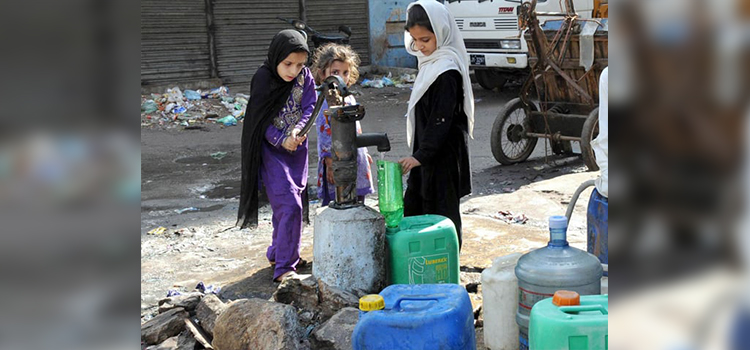A recent study by Karachi University (KU) has revealed alarming levels of contamination in the water supply to Liaquatabad Town, Karachi, with traces of metals and fecal matter making it unsafe for human consumption. The research, conducted by Assistant Professor Dr. Aamir Alamgir and his team from KU’s Institute of Environmental Studies (IES), was published in the EQA – International Journal of Environmental Quality.
The study titled “Appraisal of piped water quality supplied to Liaquatabad Town, Karachi by using Water Quality Index and Geospatial Assessment,” involved collecting 23 water samples from the town in 2022. The results showed that 95.6 per cent of the samples were contaminated with metals, and nearly 74pc contained E. coli bacteria. Additionally, over 70pc of the water was found to have fecal contamination, posing a significant risk to public health.
According to the study, while most of the samples were only slightly turbid, this created ideal conditions for the growth of harmful pathogens. High levels of total dissolved solids, chlorides, and hardness were also detected, which can lead to serious health issues, including kidney stones and cardiovascular illnesses.
Furthermore, traces of lead, nickel, and iron were found in excessive quantities, with 78.27pc of the samples showing high levels of arsenic, a toxic metal that can cause diabetes, heart and lung diseases, and even cancer with prolonged exposure.
“The effects of high metal consumption on human health are well-documented and can be life-threatening. Even low levels of arsenic over time can cause serious ailments,” the study noted.
Dr. Alamgir, the principal investigator, attributed the contamination to the faulty distribution system, citing leaking or broken pipes, and the mixing of drinking water with sewage lines as major contributors. Industrial effluent contamination was also suggested, with sulfate present in some of the water samples.
He highlighted the broader impact of poor water quality in Pakistan, stating that 40pc of all fatalities and 30pc of diseases in the country are linked to contaminated water. Diarrhea remains a leading cause of death among children, and one in five Pakistanis suffers from waterborne diseases due to polluted water, according to national health data.
This latest study adds to a growing body of research showing similar findings across other high-risk areas of Karachi. The researchers have called for urgent intervention to address the city’s water contamination crisis to protect public health.
